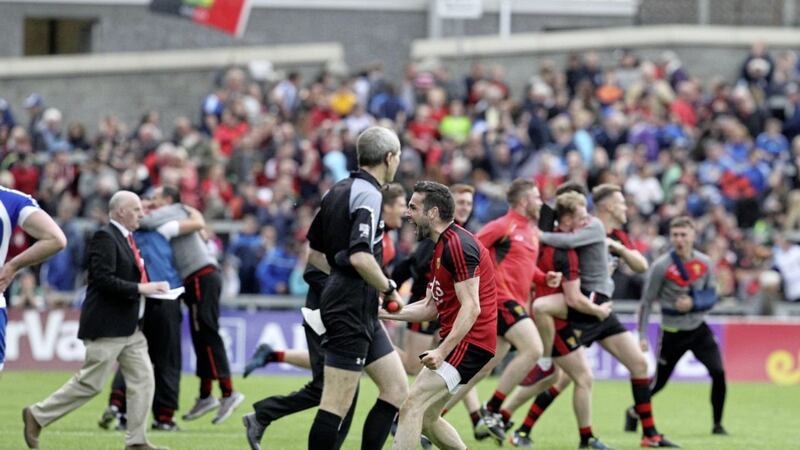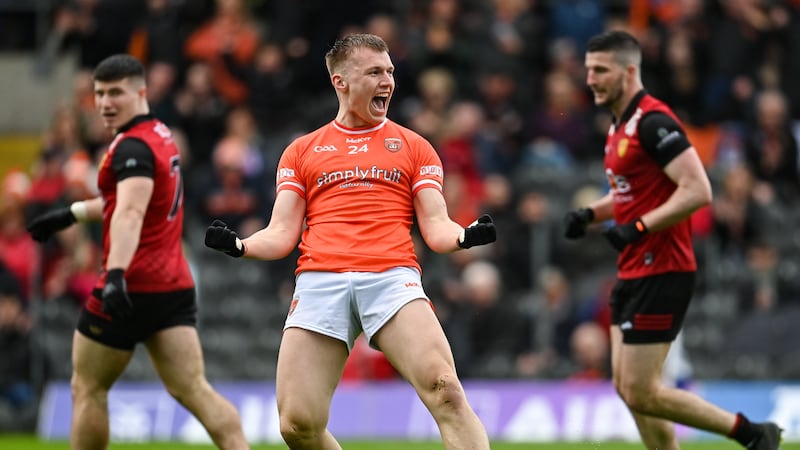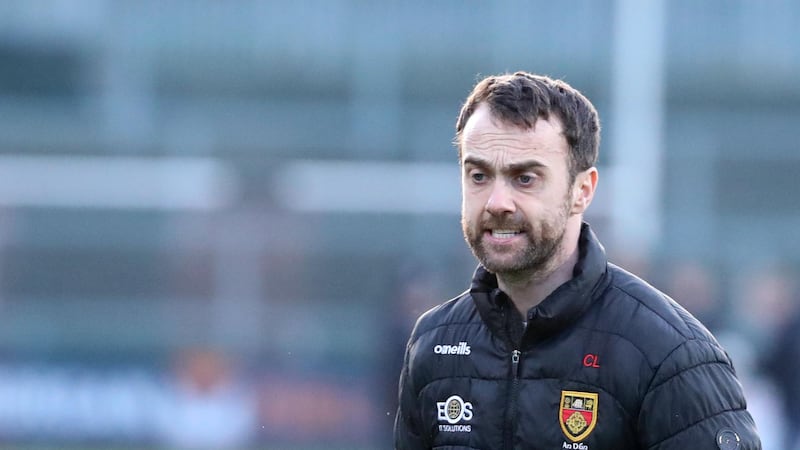“ARE you mad in the head? Why would you put your name to something like that?” It isn’t exactly the reaction you expect - or hope for - once word gets around, but Cathal Murray wasn’t worried.
The “that” in question was Down, the wreckage of a disastrous campaign still smouldering at the roadside by the time Eamonn Burns picked up the phone towards the end of September last year.
Burns wanted Murray to come in as second in command, part of a rejuvenated backroom team ready to sweep 2016 under the carpet and begin 2017 anew.
The two men know each other well, comrades under the hugely successful Pete McGrath regime of the early ‘90s. Murray himself is a nephew of the great Patsy O’Hagan, and was reared on stories about those mighty men of the ‘60s.
But this was not Down as they knew it.
Rarely in recent history had things been so bad. Wiped out in Division One, losing all seven games en route to relegation, all that awaited them in Championship was a humiliating 19-point hammering at the hands of Monaghan.
A few weeks later, lowly Longford delivered the knockout blow before a pawltry crowd at Pairc Esler. Down fans had to go back to April 2015 for a win in League or Championship, with little prospect of that changing any time soon.
Having surveyed the landscape, you couldn’t have blamed Murray had he made his excuses and politely declined Burns’s offer.
A hugely successful schools’ coach with experience at club and county level – he worked alongside Frank Dawson with Antrim in 2012/13 – hooking up with Down appeared high risk, potentially low reward.
So, why would he put his name to something like that?
“When your county comes and asks, you feel you can make a difference and that’s why I got involved,” he explains.
“Eamonn gave me a call and said 'I’ll leave it with you' - I rang him back within the hour to say yes, absolutely.
“How often does the chance to work with the best players in your own county come along? Down have club sides competing in the Ulster Club at senior and intermediate level, we’re producing quality players, I don’t think that has ever been in doubt.
“I’ve watched a lot of club football, I was involved with Saul for a number of years, and it was just a chance to make a difference.”
And what a difference a year has made to the Mournemen.
Victory, at last, over Meath in March ended the barren run and released the pressure valve. On the final day of the League they travelled to Cork, the graveyard of so many Down teams since the turn of the decade, needing at least a draw to save their skins.
Make or break, they made it – just. A Jerome Johnston point in added time snatched an unlikely point and saw them dodge the drop on score difference.
If that was the turning point of their season, and of Burns’s reign, the next month ignited a charge towards Championship that heralded against the odds victories over Armagh and Monaghan and an unexpected Ulster final date with Tyrone on Sunday.
That upsurge in fortunes was down, in no small part, to Cathal Murray.
Seven of the current Down panel – Michael Cunningham, Caolan Mooney, Ryan and Jerome Johnston, Donal O’Hare, Niall McParland and Niall Donnelly - passed through Murray’s hands as St Colman’s College landed an historic back-to-back Hogan Cup double in 2010 and 2011.
The close bond he shares with those he has seen grow from boys to men is viewed as central to the upturn in the Mourne County’s fortunes, but Murray believes that notion has been overplayed.
“I’d a lot of those players through the school and I knew what they could do, I knew the calibre of them, but I would like to think I’m a players’ man,” he continued.
“You would be constantly talking to people. If they’re in bad form or if things aren’t going well, you have to try and bring them along with you. That would be my approach to it, I would be very hands on with all the players and not just the players I’ve had previously.
“I suppose having that previous relationship was certainly to our advantage, but maybe it was a case of everybody responding to something fresh, something different coming in and not just the players I knew.
“The players are there, the quality has been there, but it’s maybe a change of attitude. Digging out a result in Cork - players stepped up in the last 20 minutes, you could see the leadership.
“Guys who maybe in previous campaigns had thought it wasn’t going to happen decided they weren’t going to let it not happen.”
Sometimes opposites attract too, and Murray’s match-day demeanour is in stark contrast to Burns.
Whereas the Down boss seldom displays his emotions on the sideline, Murray is a ball of activity from first minute to last – shouting, pointing, cajoling.
Indeed, one of the defining images of the Ulster Championship to date was the Clonduff man leaping sky high into the air, eyes closed, arms pumping furiously when Down finally got over the line against neighbours Armagh in Newry.
With St Colman’s College just two miles out the road from Pairc Esler, the school’s alumni drawn from either side of the county line, victory that glorious Sunday afternoon tasted particularly sweet.
“I was looking for some of my students because I’d faced weeks of torment,” he smiles.
“It’s in my nature… you have to enjoy a win.”
Having a conduit between management and players is a crucial part of any modern day backroom team, and it is a role Murray is only too happy to play.
Training each new crop that comes through the doors at Violet Hill provides him with a valuable insight into what makes young men tick – and the pressures they face away from the football field.
“It’s key,” continues Murray. “I’m on the field all the time, you’ve a bond with them.
“The manager makes the tough calls, the big decisions and the structure of the whole thing whereas there’s maybe not just as much pressure on the rest of us.
“Eamonn took so much flak last year, it was disgusting some of the things that were written and said about him. You hear Kevin McKernan talking about the keyboard warriors out there, but it’s a different age from when we were playing football.
“I’m not on any social media thank God, but it’s a cruel and very vindictive side to the game. I don’t envy the players of today having to face all that. Anything I can do in terms of contact with the players, talking to players, getting a wee bit closer to the players than the manager, I saw that as a role I could fulfil.”
In a refreshing twist from the previous 12 months, social media platforms have largely been filled with well-wishers lauding Down’s resurgence and good luck messages ahead of their next attempt to confound the bookmakers once more.
Eamonn Burns was praised for remarking that the Mournemen would “enjoy tonight first” before turning their attention to the Red Hands after slaying Monaghan.
On the way back from Cork six weeks ago, a hastily-deleted tweet showed smiling players on the bus celebrating with a beer on the long trip home. It was the same in his playing days, and it didn’t do Down any harm then.
Murray is a firm believer that men are not machines. Celebrating properly, living the moment, is the best part of winning. Otherwise, what’s the point?
“We enjoyed a beer in our day. You loved being in Clones because it took you two hours to get out of it so you had to spend the time somewhere!
“What harm does it do? Those boys having a night out, a bit of banter, a few beers, it does help form that bond. You can go on activity weekends but there’s no better way of creating that tightness in a group than celebrating a win.
“It was the same on the way back from Cork, we enjoyed ourselves. It is frowned upon, but you don’t have to live like monks. We were back at training on the Tuesday night and the boys worked hard, they sweated…
“It was a tough one,” he smiles, “but the craic was still good because they carried that in from the game and the night out.”
Why would he put his name to something like that? There’s that question again. The answer? For days like this.
And Murray, Burns, the Down players and the whole of the county will hope that, come 3.30pm on Sunday evening, the party will just be getting started again.








